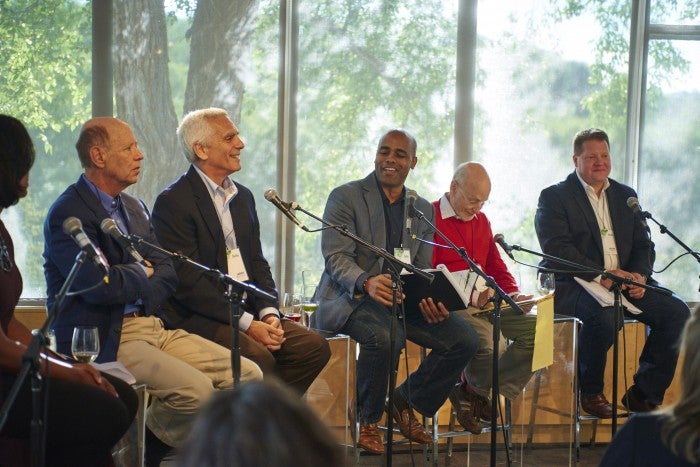The Aspen Initiative on Financial Security held its fourth annual Financial Security Summit in July in Aspen, Colorado. This is the fifth in a series of seven posts describing each Summit session. Links to the other posts and an overview of the Summit can be found here.
On the evening of July 16th, participants gathered at the Aspen Meadows for an interview and panel discussion featuring Jared Bernstein’s newest book, The Reconnection Agenda: Reuniting Growth and Prosperity. The panel included David Blitzer, Managing Director at S&P Dow Jones Indices; Jason Fichtner, Senior Research Fellow at the Mercatus Center; CEO of Global Policy Solutions Maya Rockeymoore; Urban Institute Fellow Eugene Steuerle; and was moderated by Jamal Simmons of the Raben Group. This panel tackled the question, “Why isn’t economic growth helping middle and working class Americans, and what can we do about it?” The panelists discussed policies such as expanded public investment, financial market reform, and targeted job creation, as well as the political feasibility of these policies. This evening session provided an opportunity for participants to step back and take a broad look at federal government policy, and to consider macroeconomic solutions to financial security issues.

First, Jared Bernstein, a Senior Fellow at the Center on Budget and Policy Priorities, identified some of the economic issues preventing growth from translating into broadly shared prosperity: the gap between productivity and wages, the absence of full employment, persistent trade deficits, and regular market crashes. Bernstein emphasized the need to utilize fiscal policy to increase demand and create jobs for disadvantaged groups. “Macroeconomic growth is necessary but not sufficient” to reconnect the middle class, he said. Bernstein also advocated for stronger financial reforms to stop the “shampoo cycle” of “bubble, bust, repeat.” Although politicians on both sides of the aisle have taken up these issues, Bernstein acknowledged that partisanship remains an obstacle to policymaking: “People have made the system fail for political reasons.”
Jason Fichtner agreed that there is a feeling of disconnect in today’s middle class. “Perception is nine-tenths of reality,” said Fichtner, “People may not know exactly what’s wrong, but they feel it, and if they feel it that makes it real.” Fichtner proposed using work incentives as a “galvanizing force” to create a policy consensus, as has been done with the Earned Income Tax Credit. However, Fichtner doubted that some of Bernstein’s policy solutions are politically viable, not because of partisan in-fighting, but because of resistance from powerful special interests and lobbyists. “Even if you can start getting a consensus…that still doesn’t mean you guarantee action,” said Fichtner. Eugene Steuerle was also skeptical that Bernstein’s policies could gain public support. He asserted that politicians too often make promises they cannot keep—not out of duplicity, but because the budget is too squeezed by prior spending commitments. Current public policy is skewed toward a “consumption agenda” when it should be focused on “mobility and opportunity,” said Steuerle. He suggested reducing tax incentives away from retirement and health care, which benefit mostly older, wealthier Americans, and using the savings to invest in future generations.
David Blitzer agreed with Bernstein’s agenda and also suggested tougher anti-trust regulations to prevent monopolies that cause market failures. “We’ve had the opposite of anti-trust, a massive merger movement,” said Blitzer. He noted that the current consolidation in the financial services sector is close to pre-1929 crash levels. Maya Rockeymoore agreed that industry consolidation is a big issue preventing reconnection. “We see hypercapitalism trying to devour public sector goods so they can be monetized for private sector gain,” said Rockeymoore. She then turned the conversation to the changing demographics of the nation. By 2043, the majority of Americans will be racial minorities, but these populations are still struggling against structural discrimination. “These are the people for whom policies do not work for—deliberately so,” said Rockeymoore, “They are struggling to achieve mainstream financial security.”
In the question and answer session, participants raised several additional barriers that reduce broadly shared prosperity. Janis Bowdler questioned whether the economy could continue to generate sufficient growth if we continue to exclude racial minorities. Sarah Wartell agreed, stressing the need to expand educational opportunities for minorities. Aparna Mathur pointed out that a decline in middle-skill jobs may indicate that technology is replacing labor in sectors that traditionally paid decent wages. In their concluding words, the panelists agreed that we need to find solutions that will attract broad support. Jason Fichtner identified the Earned Income Tax Credit, unemployment insurance, and worker’s compensation as policy areas with potential for compromise and reform. He challenged the group to “be more innovative in finding ways that the public and private sector can work together to solve these problems.”
Watch the video footage of this session here.

